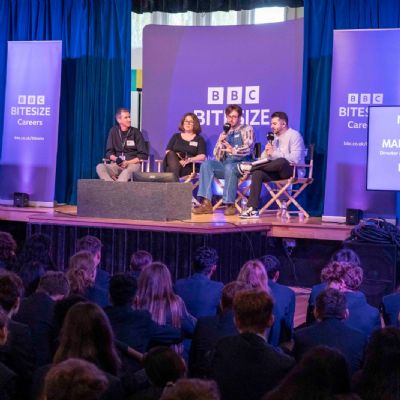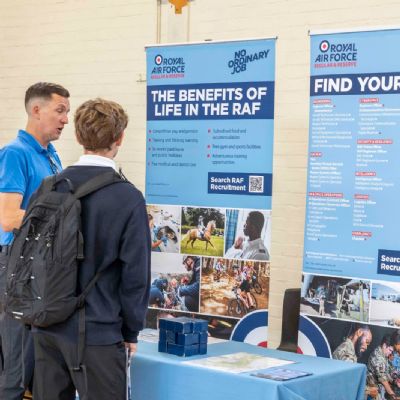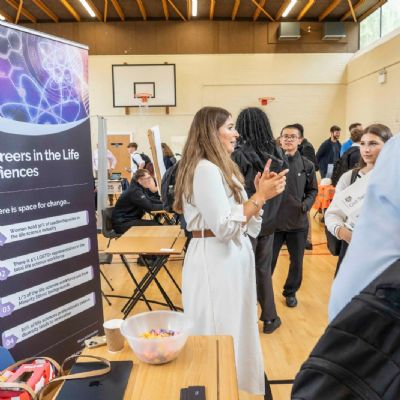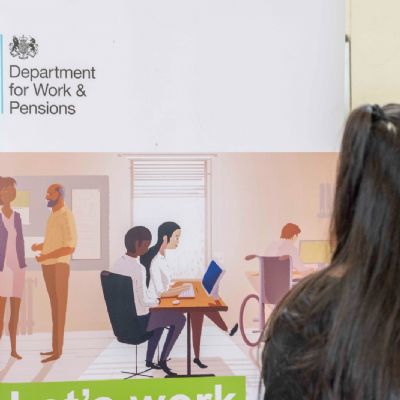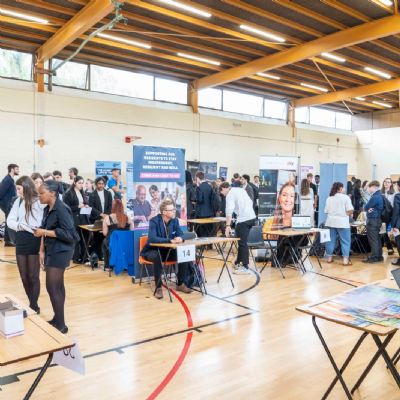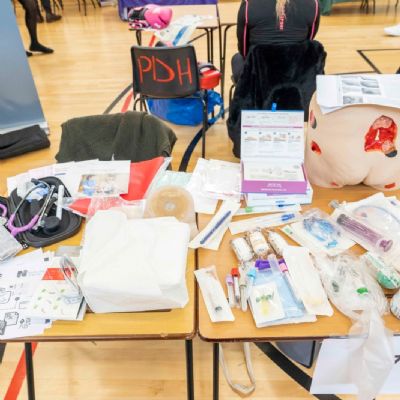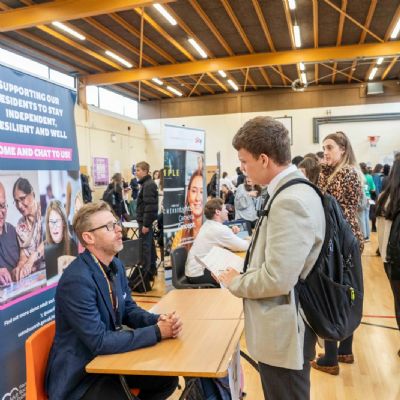Careers
Careers Education
The aim of careers education at Glenthorne is to ensure all students develop and use the knowledge and skills they need to make successful choices, manage transitions in learning and move into work.
All students are entitled to access careers guidance enabling them to assess their capabilities and aptitudes, research and plan their career paths to maximise their potential to achieve their careers goals.
At Glenthorne High School, we believe that everyone can achieve and that all of our pupils should have high aspirations for their future lives. We will provide all pupils with support in deciding upon their future career pathway. Ms Bains, Careers Leader, oversees careers education in the school, working with teaching staff who are planning and delivering careers activities.
|
Contact Tel: 020 8644 6307 Director of Careers and STEM: Miss J Bains (JBA@glenthorne.sutton.sch.uk) Careers Administrator: Miss K Chan (KCH@glenthorne.sutton.sch.uk) Careers Governor: Mr T Berry |
Employer Interactions:
Careers - Key Stage 3
All pupils at KS3 can expect to:
- Begin to develop an awareness of your individual skills, strengths and preferred learning styles in relation to post 16 pathways and future career goals.
- Be able to access careers resources via Unifrog
- To set targets and review your progress through Academic Tutoring day
- Receive careers information and ongoing support from staff
- Take part in the year 8 Pathways event where you can access information about different curriculum areas and the implications of studying specific subjects in Key Stage 4.
- Be included in STEM immersion days
- Have access to STEM extra and super-curricular events
Destinations Day
We hold a Destinations Day careers and pathways fair before Year 8 to choose their options. Our events are supported by a wide range of organisations and pupils are given the opportunity to meet representatives and to ask questions.
We run a range of career-focused activities throughout Key Stage 3, including speakers and workshops.
SLT Interviews
Students in Years 8 and 11 have an interview with a senior member of staff about their options choices. This is another opportunity for impartial advice and guidance. Students are expected to be able to explain their choices.
Careers - Key Stage 4
All pupils at KS4 can expect to:
- Experience careers education, focused on your development, labour market awareness, educational pathways and employability skills, as part of a Spiritual, Moral, Social and Cultural education programme, through tutor group time and through Aspirations Days
- Be offered an individual appointment with a qualified, independent, impartial careers advisor
- Devise an action plan towards your career goal
- Have taken part in an enterprise activity
- Have listened to talks on different careers
- Have been given the opportunity to speak to representatives from various sectors of the world of work
- Have developed financial capability skills
- Have produced and reviewed a curriculum vitae
- Been given impartial advice and guidance on post-16 education, employment and training and apprenticeship options
- Develop presentation and interview skills
- Be able to access careers information and resources via Unifrog
- Have visited or spoken to representatives of further or higher education institutions, such as universities.
- Take part in work experience.
- Have access to STEM extra and super-curricular events
We carry out a varied programme of careers-focused activities throughout Key Stage 4; amongst which, we host speakers, take part in workplace visits, engage with employers and apprenticeship providers, as well as providing access to higher and further education providers.
Year 10 experience dedicated Aspirations Days, which involve a wide range of Careers and Enterprise-related activities and employer contact.
SLT Interviews
Students in Years 8 and 11 have an interview with a senior member of staff about their options choices. This is another opportunity for impartial advice and guidance. Students are expected to be able to explain their choices.
Careers - Key Stage 5
All pupils at KS5 can expect to:
- Participate in an enrichment and tutorial programme focused on your personal development
- Opportunity to set targets and review your progress through Academic Review Day and ongoing support from your tutor and subject teachers
- Develop independent research skills
- Have taken part in Year 12 Progression Week
- Have had the opportunity to meet university representatives
- Have had the opportunity to meet apprenticeship providers
- Have been given the opportunity to visit universities
- Have been given the opportunity to volunteer or take part in work experience
- Have received a regular bulletin, containing up-to-date information on higher education taster days, apprenticeship and job opportunities
- Understand the UCAS process and be able to research different universities and courses using online resources
- Have information and support with financial planning for university, work and training
- Have written a personal statement for a UCAS or job application
- Have been mentored through the university application process or supported with job or training applications
- Have access to information on how to apply for internships, sponsorships or Gap Year placements
- Have been given the opportunity to take part in enterprise and challenge activities.
- Have access to STEM extra and super-curricular events
Sixth formers receive extensive guidance in their career decision-making process, as well as structured UCAS and apprenticeship support, including targeted support for those applying to the most selective universities. Students attend careers fairs, benefit from a programme of speakers and take part in careers events. Each Year 12 student is given the opportunity to spend time in the workplace. All sixth form students are offered face-to-face or online independent careers advice.
Information for Parents
There are now a broad range of options available post 16 and post 18. Parents have a crucial role in supporting a child goals and aspirations, with this in mind, we want you to be able to talk to your child about their options confidently; knowing that the information you have is as accurate and as up to date as possible.
Please find below a list of helpful resources that can help you have meaningful discussions with your child about their future:
UCAS: University Guide for Parents
UCAS: Student Finance - Guide for Parents
Amazing Apprenticeships: Useful monthly parent pack and a ‘Parents guide to Apprenticeships’
Target Careers: Dedicated parents section covering University Choices, Careers and Apprenticeships.
UK Job Market Guide: Useful information on the changing job market.
Parental Guidance: Careers Information and Advice from the Careers Writers Association.
Guardian University League Table: An interactive University League Table guide.
Career Mag for Parents: Aims to connect students and their parents to quality advice and guidance on careers and further education choices.
Apprenticeships
At Glenthorne, pupils are encouraged to explore all post-16 and post-18 options, including apprenticeships. Apprenticeships are becoming an increasingly attractive alternative to the traditional higher education route.
What is an Apprenticeship?
Apprenticeships give young people the opportunity to work for a real employer, earn a real salary and gain a real qualification whilst gaining valuable workplace skills and experience. Anyone living in England, over 16 years old and not in full-time education can apply to be an apprentice.
All apprentices should work for at least 30 hours a week, apart from in exceptional circumstances.
Quality is key to apprenticeships. All apprenticeships must be at least 12 months long and lead to a national qualification that is respected by employers around the world.
Salary
All apprentices must receive the appropriate national minimum wage. Check out National Minimum Wage Rates for updates on the latest figures.
Types of Apprenticeships available
There are three types of Apprenticeship that vary depending on current skills and qualifications:
1 - Intermediate Level Apprenticeships - Offers GCSE level equivalent qualifications.
2 - Advanced Level Apprenticeships - Offers A-Level equivalent qualifications.
3 - Higher Apprenticeships - Offers Degree level equivalent qualifications.
Need more support?
Websites such as:
Amazing Apprenticeships, Apprenticeships and Rate My Apprenticeship provide comprehensive support and information for students and parents on the different types of Apprenticeships available. There is also some very helpful advice and links on Get My First Job and Not Going to Uni.
Students can also access the full database of apprenticeship vacancies that are available at The Apprenticeship Guide and Find an Apprenticeship.
Higher Education Preparation
Please also find below a list of helpful resources that can help students with researching their higher education options:
UCAS: All higher education (university) course applications are made through UCAS.
Which University: Useful website to research universities ad courses.
What Uni: Helps students find universities and courses using their University Comparison Tool.
Unistats: Lots of statistical information about Uni courses – allows students to compare courses.
Applying to Uni: News and advice about applying to Uni.
Student Finance England: Links to useful student finance sites.
Uni Taster Days: Up to date listings of Uni Taster Days. It is strongly recommended that students who want to go to University should attend at least two of these.
Russell Group Informed Choices: Entry requirements for Russell Group Universities.
Open Days: Up to date list of virtual University open Days.
The Scholarship Hub: Information about Scholarships, Grants, Bursaries and Financial Awards.
Studying Overseas:
Fulbright Commission: The starting point for information about study in the USA.
QS Top Universities: Information about overseas study worldwide.
The Complete University Guide for Overseas Study: This site has a dedicated area for students interested in study overseas
Labour Market Information
Labour market information (LMI) supports parents and students to understand the job market in both the local and wider area. The following site can support parents in conversations about careers, qualifications and pathways allowing students to make informed choices about their next steps.
National Careers Service provides excellent information about a wider variety of job roles.
Target Careers: Key information on different careers sectors – includes useful advice and information such as salaries, the types of jobs available and what your options are with, or without, a degree.
LMI Future Trends: To view useful information on the national labour market and future trends including Sutton, Merton and the wider London area.
Working Futures 2014-2024: Report produced by the UK Commission of Employment and Skills on the future of work in the UK.
Target Jobs : Focus on graduate job descriptions to find out what each job involves and the qualifications and skills that are need in that career
Careerometer: Find out about pay and projected workforce changes in different jobs.
Creative Industries: Independent review of the Creative Industries
Evaluation of the Careers Programme
We assess our Careers Program termly and after Key events in the following ways:
- Compass+ is used evaluate our programme against the eight benchmarks of best practice (known as the Gatsby Benchmarks).
- The school’s careers leader (a member of the senior leadership team) has a termly meeting with the South London Careers Hub and Enterprise advisors to review the impact of our provision and make amendments as required
- Following careers interviews, Destinations day, Aspirations and Work experience, students are sent a questionnaire to allow us to evaluate the impact and to amend implementation, if required.
- Employers, staff, and parents are sent a questionnaire to ensure all stakeholders feed into our careers plan
- Options selection (GCSE and A Level) and destinations patterns (Sixth Form and university) are used to determine the extent to which the careers program has enabled students to successfully move on to the next stage of their education.

